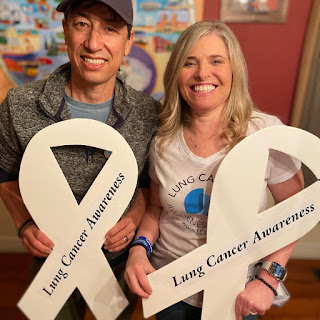Liquid Biopsy: The “Holy Grail”?
Circulating tumor cells (CTCs), tumor cells that are shed
from primary tumors in the body and carried through the circulation, were
discovered some 140 years ago. Researchers
have struggled to create an efficient way of capturing these elusive and rare
cancer cells, and perform genetic analysis to learn about their growth
characteristics and molecular evolution.
I’m inspired and encouraged by the work of Dr. Bert
Vogelstein, at Johns Hopkins. Dr. Vogelstein
is credited with having proved that damaged DNA causes cancer. Nearly every type of cancer sheds DNA into the
bloodstream, so Vogelstein and his colleagues are trying to prove that cancer
can be diagnosed much earlier -- perhaps decades earlier -- using a procedure
called "liquid biopsy."
But the technology isn't clinic-ready yet, and the screening
process is still too expensive. We are
nowhere near the reality of liquid biopsy being used in, for instance, your
annual check-up. Making such screening a
routine practice in medicine will be challenging. One challenge is that while the test may
detect the presence of cancer DNA in the body, doctors might not know where the
tumor is, how dangerous it is, or even whether it is worth treating.
In a recent MIT Technology Review article, Dr. Daniel Haber,
Director of the Massachusetts General Hospital Cancer Center was quoted, “We
have to be cautious about how we talk about that.” He believes the DNA blood
tests are “far from ready” and says very large studies will be needed to prove
that they are useful. “There is a huge bar to get over,” he says.
Dr. Haber, Mehmet Toner, PhD, and their research team at MGH
have developed a microfluidic chip called the CTC-iChip, used to isolate the
minute numbers of tumor cells circulating in the blood. The CTCs can then be
analyzed to reveal critical information about cancer growth and the effectiveness
of different treatments. Researchers believe the technology may revolutionize
the way oncologists detect, monitor and treat cancers. Janssen Diagnostics is working with the Mass
General team to transform the iChip into a “next-generation CTC-analysis
platform”.
In the long term, the goal would be to use the technology
for early detection. This will involve
much larger clinical trials and, of course, large-scale funding. Says Toner, “But
that would be the Holy Grail - where we could isolate CTC cells early, and
monitor certain mutations over time, particularly for cancers we know tend to
become aggressive.”
Eventually, “in the very long term,” CTC technology might be
used to screen the general population, Toner suggests. “The screening could be
included in the blood analysis when you go for an annual checkup with a primary
care physician, just like a CBC [complete blood count].”
This is why cancer research funding is so critical.
